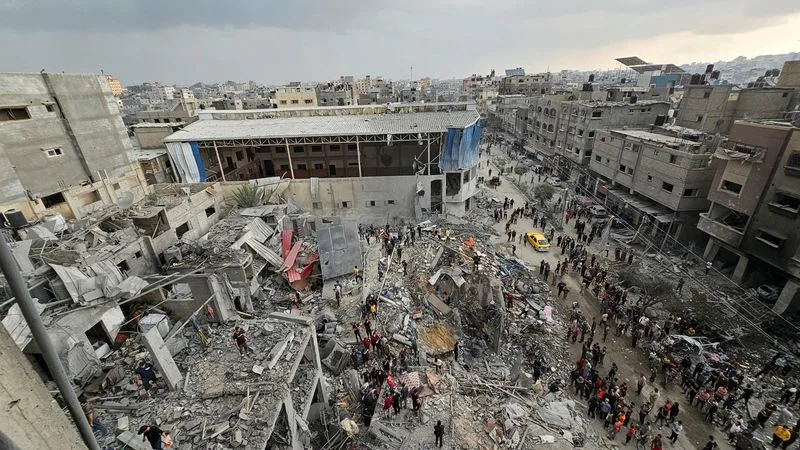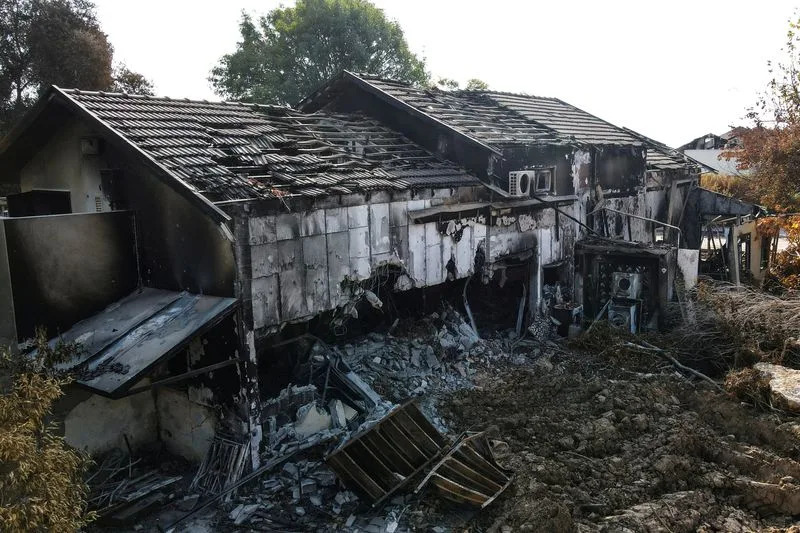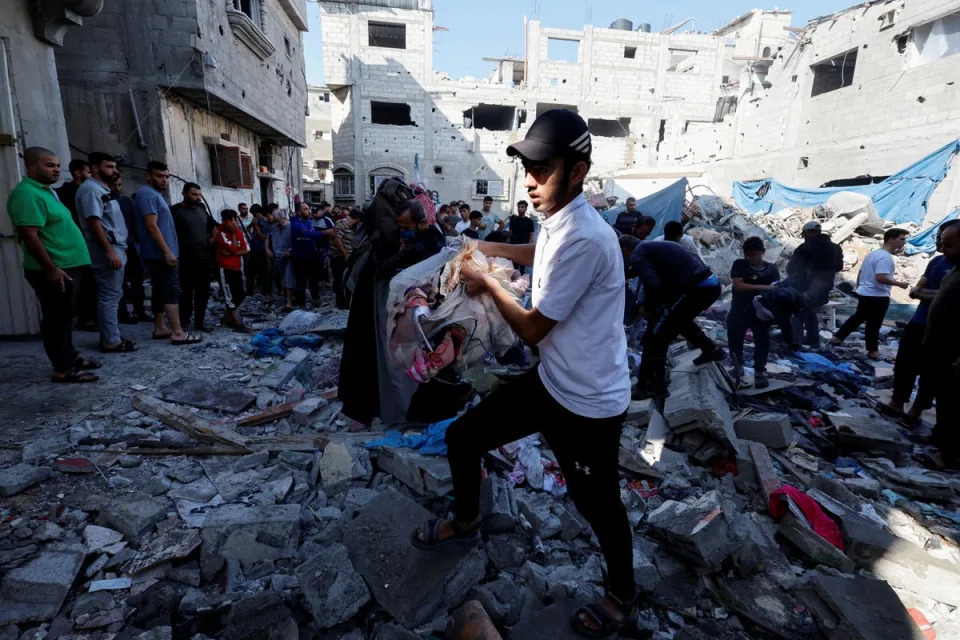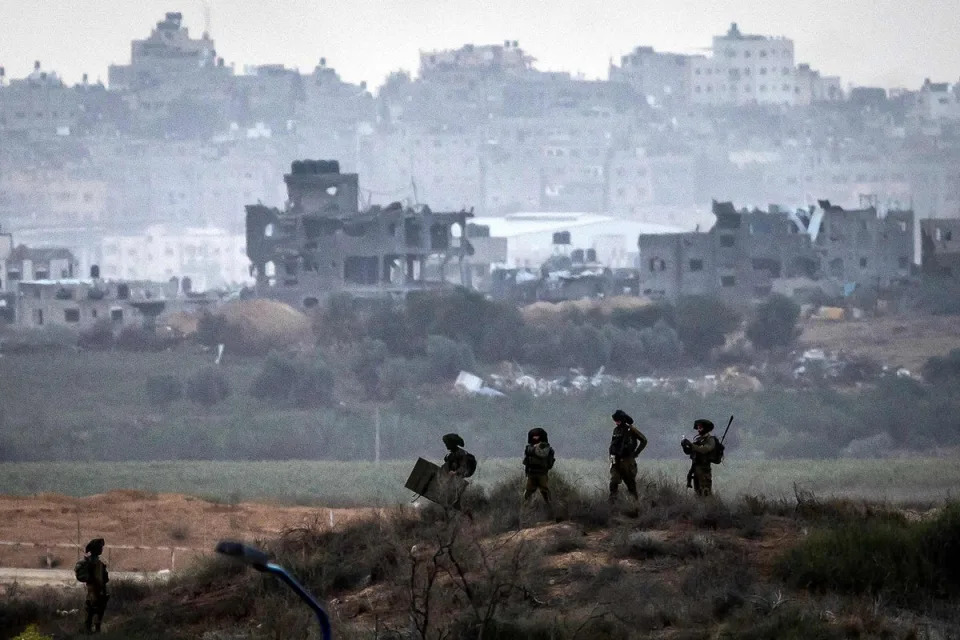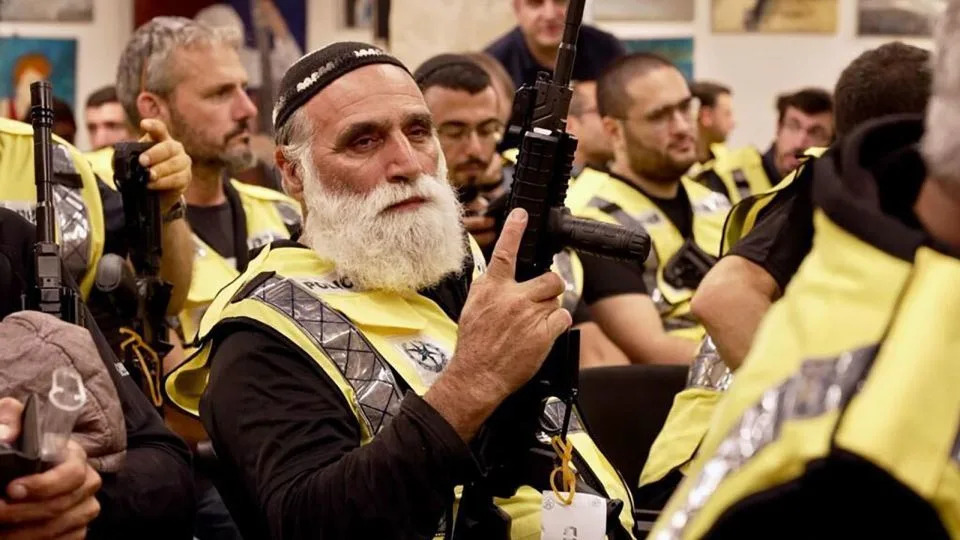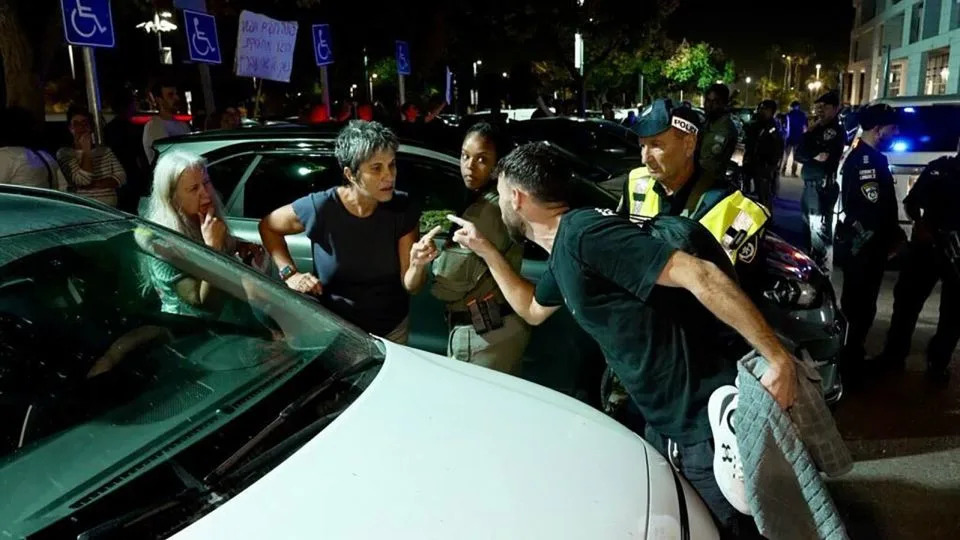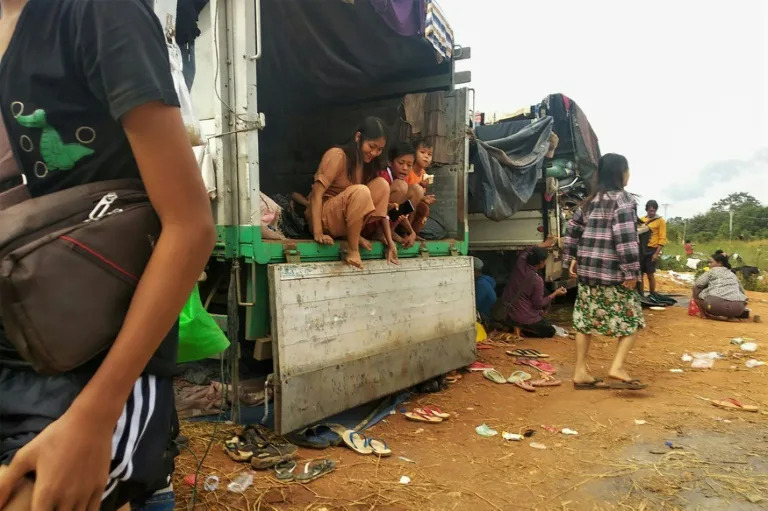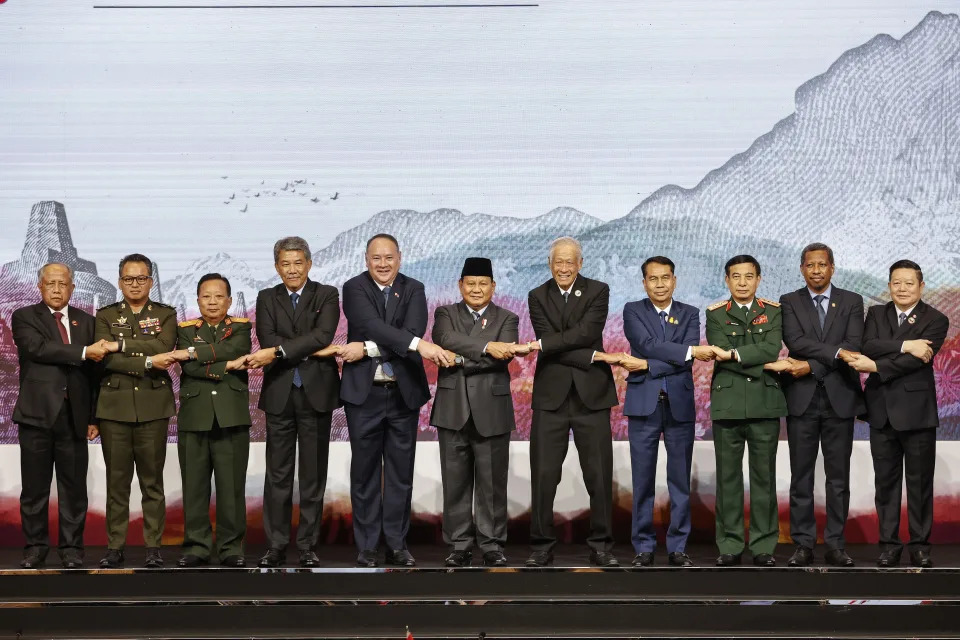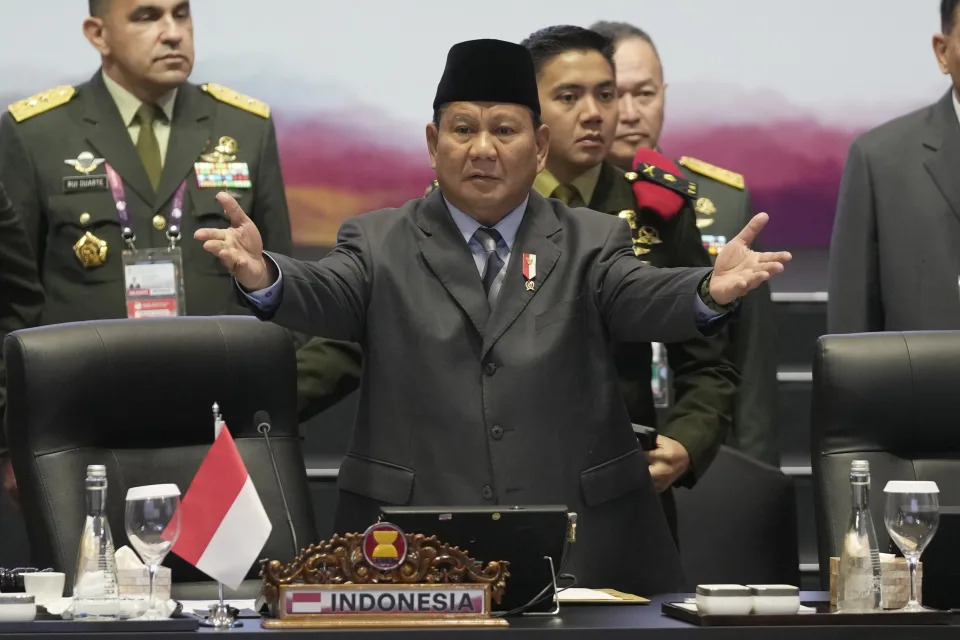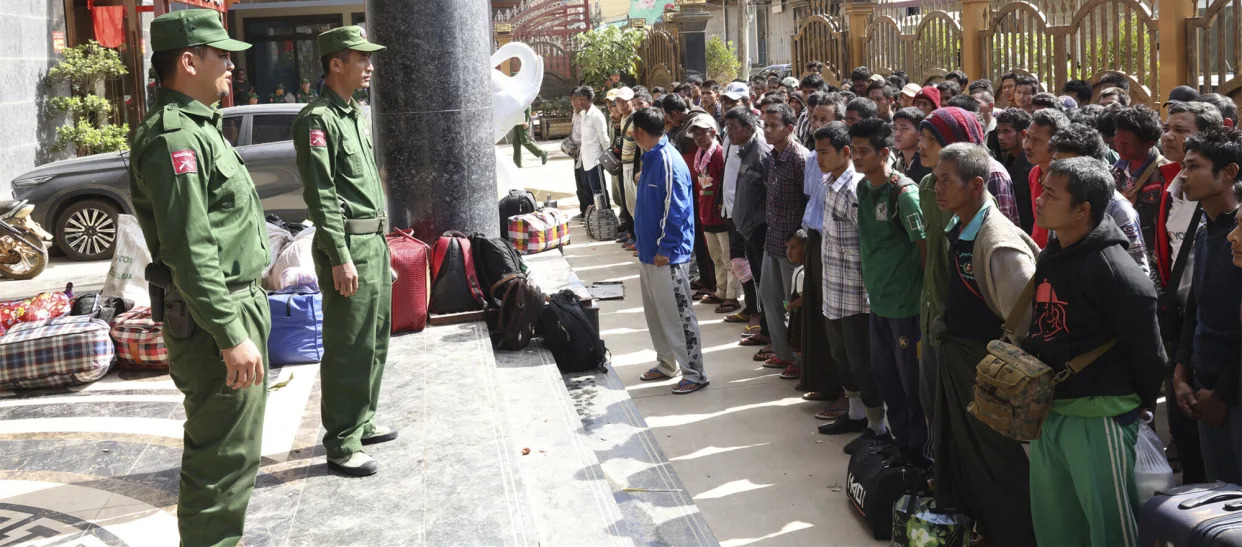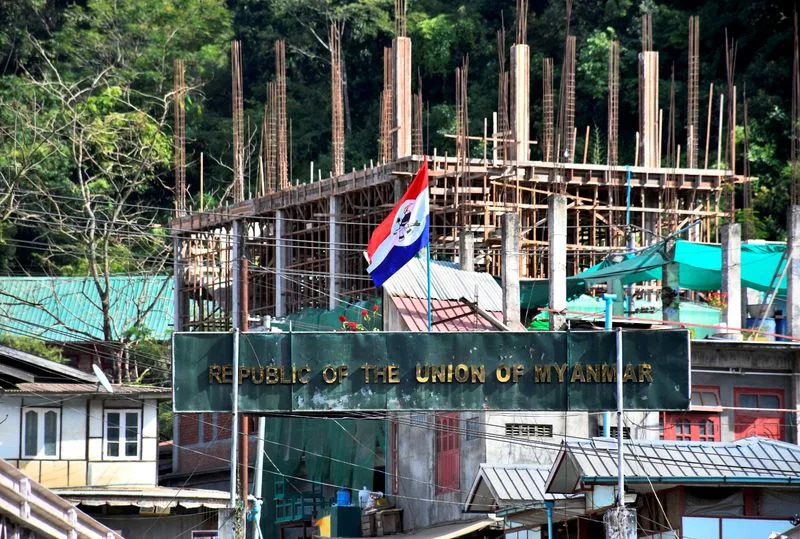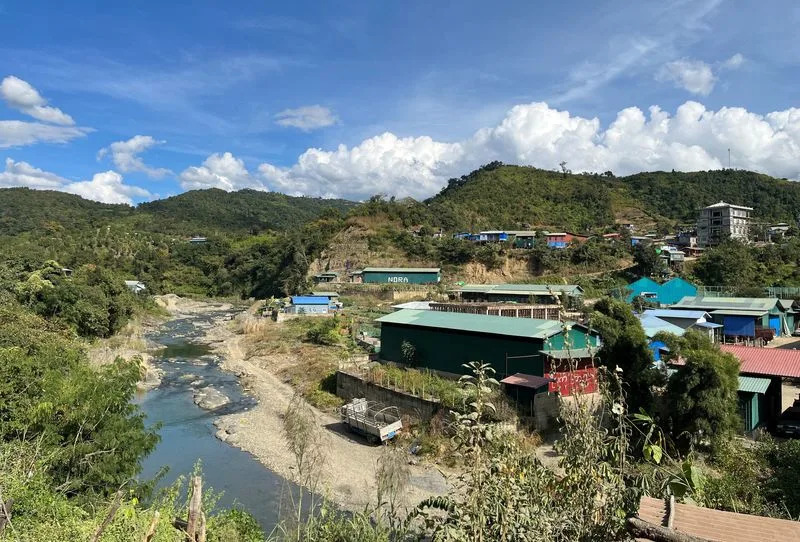Canadian PM Trudeau tells Israel killing of babies in Gaza must end
Reuters
Tue, November 14, 2023
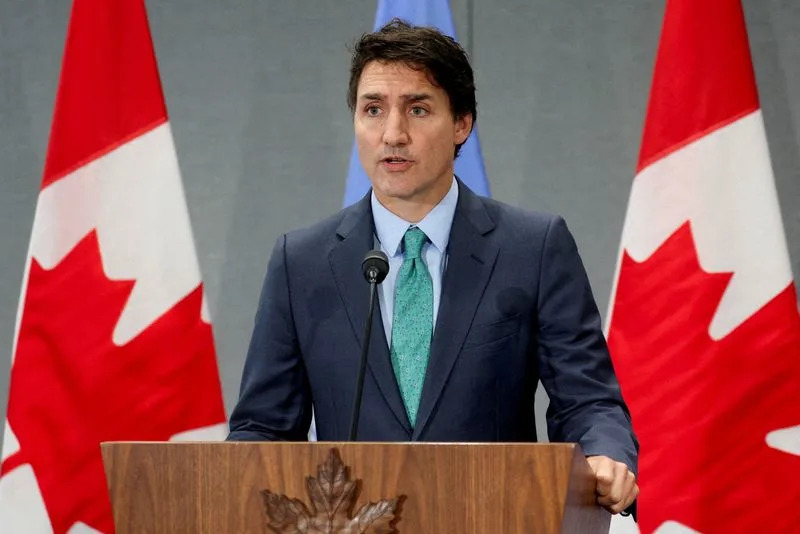
FILE PHOTO: Canadian Prime Minister Justin Trudeau speaks during a press conference on the sidelines of the UNGA, in New York
OTTAWA (Reuters) - Canadian Prime Minister Justin Trudeau on Tuesday said the "killing of women, of children, of babies" in the besieged Gaza Strip must end, in his sharpest criticism of Israel since war against Hamas broke out over a month ago.
Canada has maintained that Israel has the right to defend itself against Hamas after the Palestinian militant group attacked southern Israel last month, killing 1,400 people and taking over 200 hostage. But like the United States and other allies, it has expressed increasing concern over the mounting death toll in the battered enclave, where local health officials say 11,000 people have been killed since the conflict started.
"I urge the government of Israel to exercise maximum restraint. The world is watching, on TV, on social media - we're hearing the testimonies of doctors, family members, survivors, kids who have lost their parents," he said.
"The world is witnessing this killing of women, of children, of babies. This has to stop," he told a news conference in the western province of British Columbia.
The lives of 36 babies at Gaza's Al Shifa Hospital were hanging in the balance on Tuesday, according to medical staff there who said there was no clear mechanism to move them despite an Israeli effort to supply incubators for an evacuation.
Three of the original 39 premature babies have already died since Gaza's biggest hospital ran out of fuel at the weekend to power generators that had kept their incubators going.
Trudeau also said Hamas needed to stop using Palestinians as human shields and should release all its hostages.
Around 350 Canadian citizens, permanent residents and family members had been evacuated from Gaza, he added.
Last week Trudeau called for a significant humanitarian pause in the conflict to allow for the release of all hostages and the delivery of enough aid to address civilian needs.
(Reporting by David Ljunggren, editing by Deepa Babington)
Israel defends airstrikes in Gaza: ‘We are not fighting for our image’
Nick Robertson
Tue, November 14, 2023

A spokesman for the Israeli government defended his country’s offensive into Gaza on Monday, admitting that “the optics” of the airstrike campaign and ground offensive are “bad,” but that the country is not concerned with the way things look.
“You’re right, the optics are bad. But we are not fighting for our image, we are fighting for survival,” Eylon Levy told NewsNation’s Chris Cuomo on Monday.
The Israel-Hamas war began early last month after Hamas militants launched a surprise attack on border settlements, killing about 1,200 people and taking another 200 hostage.
“The optics of the Oct. 7 massacre are even worse — 1,200 people who were brutally executed, butchered, beheaded, burned,” Levy said. “Many of them tortured and mutilated before they were killed, their bodies mutilated after they were killed.”
“That is what we are fighting against, and our right to self-defense, our duty of self-defense, is to eliminate the terrorist organization that did that,” he added.
More than 11,100 Palestinians have been killed in the subsequent war, including more than 4,600 children, according to the Hamas-controlled Gaza Health Ministry, leading to criticism of the Israeli government over how it has conducted the military operation.
The Biden administration, which has strongly backed Israel in the conflict, has pushed its government to better allow humanitarian aid access into Gaza.
Israel agreed to four-hour “humanitarian pauses” in fighting in order to allow civilians to flee areas of conflict last week, but the Biden administration has lobbied for longer pauses as negotiations over hostage releases continue with Qatar as a mediator.
Fighting in Gaza has centered on Gaza City, the largest settlement in the territory, and specifically on the city’s hospitals in recent days. The Israeli military has claimed that Hamas militants use hospitals as command posts and access points to underground tunnel systems, which both Hamas and hospital administrators have denied.
NewsNation is owned by Nexstar Media Group, which also owns The Hill.
Reuters
Tue, November 14, 2023

FILE PHOTO: Canadian Prime Minister Justin Trudeau speaks during a press conference on the sidelines of the UNGA, in New York
OTTAWA (Reuters) - Canadian Prime Minister Justin Trudeau on Tuesday said the "killing of women, of children, of babies" in the besieged Gaza Strip must end, in his sharpest criticism of Israel since war against Hamas broke out over a month ago.
Canada has maintained that Israel has the right to defend itself against Hamas after the Palestinian militant group attacked southern Israel last month, killing 1,400 people and taking over 200 hostage. But like the United States and other allies, it has expressed increasing concern over the mounting death toll in the battered enclave, where local health officials say 11,000 people have been killed since the conflict started.
"I urge the government of Israel to exercise maximum restraint. The world is watching, on TV, on social media - we're hearing the testimonies of doctors, family members, survivors, kids who have lost their parents," he said.
"The world is witnessing this killing of women, of children, of babies. This has to stop," he told a news conference in the western province of British Columbia.
The lives of 36 babies at Gaza's Al Shifa Hospital were hanging in the balance on Tuesday, according to medical staff there who said there was no clear mechanism to move them despite an Israeli effort to supply incubators for an evacuation.
Three of the original 39 premature babies have already died since Gaza's biggest hospital ran out of fuel at the weekend to power generators that had kept their incubators going.
Trudeau also said Hamas needed to stop using Palestinians as human shields and should release all its hostages.
Around 350 Canadian citizens, permanent residents and family members had been evacuated from Gaza, he added.
Last week Trudeau called for a significant humanitarian pause in the conflict to allow for the release of all hostages and the delivery of enough aid to address civilian needs.
(Reporting by David Ljunggren, editing by Deepa Babington)
Israel defends airstrikes in Gaza: ‘We are not fighting for our image’
Nick Robertson
Tue, November 14, 2023

A spokesman for the Israeli government defended his country’s offensive into Gaza on Monday, admitting that “the optics” of the airstrike campaign and ground offensive are “bad,” but that the country is not concerned with the way things look.
“You’re right, the optics are bad. But we are not fighting for our image, we are fighting for survival,” Eylon Levy told NewsNation’s Chris Cuomo on Monday.
The Israel-Hamas war began early last month after Hamas militants launched a surprise attack on border settlements, killing about 1,200 people and taking another 200 hostage.
“The optics of the Oct. 7 massacre are even worse — 1,200 people who were brutally executed, butchered, beheaded, burned,” Levy said. “Many of them tortured and mutilated before they were killed, their bodies mutilated after they were killed.”
“That is what we are fighting against, and our right to self-defense, our duty of self-defense, is to eliminate the terrorist organization that did that,” he added.
More than 11,100 Palestinians have been killed in the subsequent war, including more than 4,600 children, according to the Hamas-controlled Gaza Health Ministry, leading to criticism of the Israeli government over how it has conducted the military operation.
The Biden administration, which has strongly backed Israel in the conflict, has pushed its government to better allow humanitarian aid access into Gaza.
Israel agreed to four-hour “humanitarian pauses” in fighting in order to allow civilians to flee areas of conflict last week, but the Biden administration has lobbied for longer pauses as negotiations over hostage releases continue with Qatar as a mediator.
Fighting in Gaza has centered on Gaza City, the largest settlement in the territory, and specifically on the city’s hospitals in recent days. The Israeli military has claimed that Hamas militants use hospitals as command posts and access points to underground tunnel systems, which both Hamas and hospital administrators have denied.
NewsNation is owned by Nexstar Media Group, which also owns The Hill.
China, Iran, Arab nations condemn Israeli minister's statement about dropping a nuclear bomb on Gaza
ISRAEL DENIES HAVING THE BOMB
EDITH M. LEDERER
Tue, November 14, 2023
UNITED NATIONS (AP) — China, Iran and a multitude of Arab nations condemned an Israeli minister’s statement that a nuclear bomb on the Gaza Strip was an option in the Israel-Hamas war, calling it a threat to the world.
At Monday’s long-planned opening of a United Nations conference whose goal is to establish a nuclear-free zone in the Middle East, many ambassadors expressed condemnations and criticisms of comments by Israel’s Heritage Minister Amihai Eliyahu, who later called his remarks in a radio interview Sunday “metaphorical.” Israeli Prime Minister Benjamin Netanyahu quickly disavowed the comments and suspended him from cabinet meetings.
Israel has neither confirmed nor denied its nuclear capability. It is widely believed to possess nuclear weapons, and a former employee at its nuclear reactor served 18 years in Israeli prison for leaking details and pictures of Israel’s alleged nuclear arsenal program to a British newspaper in 1986.
China’s deputy U.N. ambassador Geng Shuang said Beijing was “shocked,” calling the statements “extremely irresponsible and disturbing” and should be universally condemned.
He urged Israeli officials to retract the statement and become a party to the Nuclear Nonproliferation Treaty, considered the cornerstone of nuclear disarmament, as a non-nuclear weapon state “as soon as possible.”
Geng said China is ready to join other countries “to inject new impetus” to establishing a nuclear weapons-free zone in the Mideast, saying there is greater urgency because of the situation in the current region.
U.N. disarmament chief Izumi Nakamitsu, who opened Monday’s fourth conference, didn’t mention Israel. But she said: “Any threat to use nuclear weapons is inadmissible.”
Nakamitsu reiterated the “urgency ... of a Middle East zone free of nuclear weapons and other weapons of mass destruction,” stressing that “cool heads and diplomatic efforts” must prevail to achieve peace between Israel and the Palestinians, based on a two-state solution.
Oman’s U.N. Ambassador Mohamed Al-Hassan, speaking on behalf of the six-nation Gulf Cooperation Council which includes Saudi Arabia, said the threat to use nuclear weapons in Gaza “reaffirms the extremes and brutality of the Israeli occupation against the Palestinian people” and their “disregard for innocent life.” He called on the U.N Security Council and the IAEA to take decisive action on the matter.
Lebanon’s Charge d’Affaires Hadi Hachem also condemned the Israeli heritage minister’s comments, stressing that “this self-acknowledgment of having nuclear weapons and the threat of using them by its officials, poses a serious threat to both regional and international peace and security."
He urged Israel to stop “such rhetoric or posturing” and join the Nuclear Nonproliferation Treaty as a non-nuclear weapon state.
Iran’s U.N. Ambassador Amir Iravani told the conference the nuclear threats directed toward Palestinians by high-ranking Israeli officials highlight Israel’s “pride” in having these weapons in its hands.
“The secrecy surrounding Israel’s nuclear capabilities poses a significant threat to regional stability,” he said. “In these critical times, the imperative to establish such a zone in the Middle East has never been more urgent.”
Israel did not speak Monday but Netanyahu has said his country's biggest threat remains the possibility of a nuclear-armed Iran, and it is prepared to prevent that from happening.
Efforts to create a nuclear-weapon-free zone date back to the 1960s and include a call by parties to the Nuclear Nonproliferation Treaty in 1995 and a 1998 General Assembly resolution asking countries to contribute to establishing it. The first U.N. conference aimed at creating a zone was held in November 2019.
Russia’s ambassador to the IAEA and other U.N. organizations based in Vienna, Mikhail Ulyanov, told delegates Monday that given the new escalation of violence in the Middle East, a nuclear-weapon-free zone in the region “is more pertinent than ever.”
But he said Moscow is “extremely uncomfortable” that along with the two other sponsors of the 1995 resolution – the United States and the United Kingdom – the promise to establish a nuclear-weapon-free zone in the Mideast has not been met after almost 30 years. And for more than 20 years, “there’s been almost no progress whatsoever,” he said.
EDITH M. LEDERER
Tue, November 14, 2023
UNITED NATIONS (AP) — China, Iran and a multitude of Arab nations condemned an Israeli minister’s statement that a nuclear bomb on the Gaza Strip was an option in the Israel-Hamas war, calling it a threat to the world.
At Monday’s long-planned opening of a United Nations conference whose goal is to establish a nuclear-free zone in the Middle East, many ambassadors expressed condemnations and criticisms of comments by Israel’s Heritage Minister Amihai Eliyahu, who later called his remarks in a radio interview Sunday “metaphorical.” Israeli Prime Minister Benjamin Netanyahu quickly disavowed the comments and suspended him from cabinet meetings.
Israel has neither confirmed nor denied its nuclear capability. It is widely believed to possess nuclear weapons, and a former employee at its nuclear reactor served 18 years in Israeli prison for leaking details and pictures of Israel’s alleged nuclear arsenal program to a British newspaper in 1986.
China’s deputy U.N. ambassador Geng Shuang said Beijing was “shocked,” calling the statements “extremely irresponsible and disturbing” and should be universally condemned.
He urged Israeli officials to retract the statement and become a party to the Nuclear Nonproliferation Treaty, considered the cornerstone of nuclear disarmament, as a non-nuclear weapon state “as soon as possible.”
Geng said China is ready to join other countries “to inject new impetus” to establishing a nuclear weapons-free zone in the Mideast, saying there is greater urgency because of the situation in the current region.
U.N. disarmament chief Izumi Nakamitsu, who opened Monday’s fourth conference, didn’t mention Israel. But she said: “Any threat to use nuclear weapons is inadmissible.”
Nakamitsu reiterated the “urgency ... of a Middle East zone free of nuclear weapons and other weapons of mass destruction,” stressing that “cool heads and diplomatic efforts” must prevail to achieve peace between Israel and the Palestinians, based on a two-state solution.
Oman’s U.N. Ambassador Mohamed Al-Hassan, speaking on behalf of the six-nation Gulf Cooperation Council which includes Saudi Arabia, said the threat to use nuclear weapons in Gaza “reaffirms the extremes and brutality of the Israeli occupation against the Palestinian people” and their “disregard for innocent life.” He called on the U.N Security Council and the IAEA to take decisive action on the matter.
Lebanon’s Charge d’Affaires Hadi Hachem also condemned the Israeli heritage minister’s comments, stressing that “this self-acknowledgment of having nuclear weapons and the threat of using them by its officials, poses a serious threat to both regional and international peace and security."
He urged Israel to stop “such rhetoric or posturing” and join the Nuclear Nonproliferation Treaty as a non-nuclear weapon state.
Iran’s U.N. Ambassador Amir Iravani told the conference the nuclear threats directed toward Palestinians by high-ranking Israeli officials highlight Israel’s “pride” in having these weapons in its hands.
“The secrecy surrounding Israel’s nuclear capabilities poses a significant threat to regional stability,” he said. “In these critical times, the imperative to establish such a zone in the Middle East has never been more urgent.”
Israel did not speak Monday but Netanyahu has said his country's biggest threat remains the possibility of a nuclear-armed Iran, and it is prepared to prevent that from happening.
Efforts to create a nuclear-weapon-free zone date back to the 1960s and include a call by parties to the Nuclear Nonproliferation Treaty in 1995 and a 1998 General Assembly resolution asking countries to contribute to establishing it. The first U.N. conference aimed at creating a zone was held in November 2019.
Russia’s ambassador to the IAEA and other U.N. organizations based in Vienna, Mikhail Ulyanov, told delegates Monday that given the new escalation of violence in the Middle East, a nuclear-weapon-free zone in the region “is more pertinent than ever.”
But he said Moscow is “extremely uncomfortable” that along with the two other sponsors of the 1995 resolution – the United States and the United Kingdom – the promise to establish a nuclear-weapon-free zone in the Mideast has not been met after almost 30 years. And for more than 20 years, “there’s been almost no progress whatsoever,” he said.
Israeli defense minister says ground invasion will include southern Gaza
Diego Mendoza
Tue, November 14, 2023

Israel’s Defense Minister Yoav Gallant reportedly told an IDF-operated radio news service Tuesday that the country’s ground invasion of Gaza will be months-long and include the southern part of the enclave, where around a million Palestinians were ordered to flee to as Israel began its bombardment of the north.
“The maneuver will last for many months - and it will include both the north and the south,” Gallant told the radio news service GLZ. “We will dismantle Hamas wherever it is. Hamas is getting eroded.”
The IDF did not immediately respond to Semafor’s request for confirmation regarding Gallant’s statement.
The IDF has repeatedly targeted southern Gaza via airstrikes despite ordering Palestinians from northern Gaza to evacuate there.
In defending its airstrikes on southern Gaza, Israel claims that there are “legitimate targets” of militants living near civilian homes all across the enclave. “The so-called private home is not a private home,” a senior Israeli air force officer told reporters last month. The UN estimates that as of Oct. 24, there has been a mass displacement of at least 1.4 million Palestinians away from the north, and many who can still leave continue to flee towards the south. “These people hope and have been told that by fleeing south they may lose their homes, but they will save their lives,” PBS NewsHour’s Leila Molana-Allen said after traveling within Gaza with the IDF. “But Gazans who have already reached the south say the bombardment there is nearly as bad and the living conditions unbearable,” she added, with many fearing the worst is yet to come.
Deteriorating conditions at makeshift camp settlements in south Gaza are raising fears of a looming health crisis. The refugee exodus from northern Gaza coincides with the start of the rainy season, and health experts say flooding risks overwhelming the enclave’s already damaged sewage system and spreading disease. World Health Organization officials told Al Jazeera that there are already over 30,000 recorded cases of diarrheal infections compared to an expected 2,000 cases during non-war time.
While millions have fled to the south, Gaza City’s largest hospital, and now one of its largest refugee camps, presents “Israel’s biggest moral challenge,” writes Haaretz’ Ronny Linder. Israel claims that the Al-Shifa hospital in the western part of Gaza City is the headquarters of Hamas leaders, and on Tuesday, the White House said it has its own intelligence to corroborate these claims. Israeli officials have not denied that it is considering potentially bombing or attacking the hospital and has requested some European countries to help build field and ship hospitals as alternatives to Al-Shifa. While Hamas’ alleged use of hospitals would be a war crime, “bombing a hospital is an action that is considered extreme, and the goal must be very just and clear,” said a researcher and war ethics expert at the Tel Aviv University.
Diego Mendoza
Tue, November 14, 2023

Israel’s Defense Minister Yoav Gallant reportedly told an IDF-operated radio news service Tuesday that the country’s ground invasion of Gaza will be months-long and include the southern part of the enclave, where around a million Palestinians were ordered to flee to as Israel began its bombardment of the north.
“The maneuver will last for many months - and it will include both the north and the south,” Gallant told the radio news service GLZ. “We will dismantle Hamas wherever it is. Hamas is getting eroded.”
The IDF did not immediately respond to Semafor’s request for confirmation regarding Gallant’s statement.
The IDF has repeatedly targeted southern Gaza via airstrikes despite ordering Palestinians from northern Gaza to evacuate there.
In defending its airstrikes on southern Gaza, Israel claims that there are “legitimate targets” of militants living near civilian homes all across the enclave. “The so-called private home is not a private home,” a senior Israeli air force officer told reporters last month. The UN estimates that as of Oct. 24, there has been a mass displacement of at least 1.4 million Palestinians away from the north, and many who can still leave continue to flee towards the south. “These people hope and have been told that by fleeing south they may lose their homes, but they will save their lives,” PBS NewsHour’s Leila Molana-Allen said after traveling within Gaza with the IDF. “But Gazans who have already reached the south say the bombardment there is nearly as bad and the living conditions unbearable,” she added, with many fearing the worst is yet to come.
Deteriorating conditions at makeshift camp settlements in south Gaza are raising fears of a looming health crisis. The refugee exodus from northern Gaza coincides with the start of the rainy season, and health experts say flooding risks overwhelming the enclave’s already damaged sewage system and spreading disease. World Health Organization officials told Al Jazeera that there are already over 30,000 recorded cases of diarrheal infections compared to an expected 2,000 cases during non-war time.
While millions have fled to the south, Gaza City’s largest hospital, and now one of its largest refugee camps, presents “Israel’s biggest moral challenge,” writes Haaretz’ Ronny Linder. Israel claims that the Al-Shifa hospital in the western part of Gaza City is the headquarters of Hamas leaders, and on Tuesday, the White House said it has its own intelligence to corroborate these claims. Israeli officials have not denied that it is considering potentially bombing or attacking the hospital and has requested some European countries to help build field and ship hospitals as alternatives to Al-Shifa. While Hamas’ alleged use of hospitals would be a war crime, “bombing a hospital is an action that is considered extreme, and the goal must be very just and clear,” said a researcher and war ethics expert at the Tel Aviv University.
Israeli minister calls for voluntary emigration of Gazans
Reuters
Tue, November 14, 2023
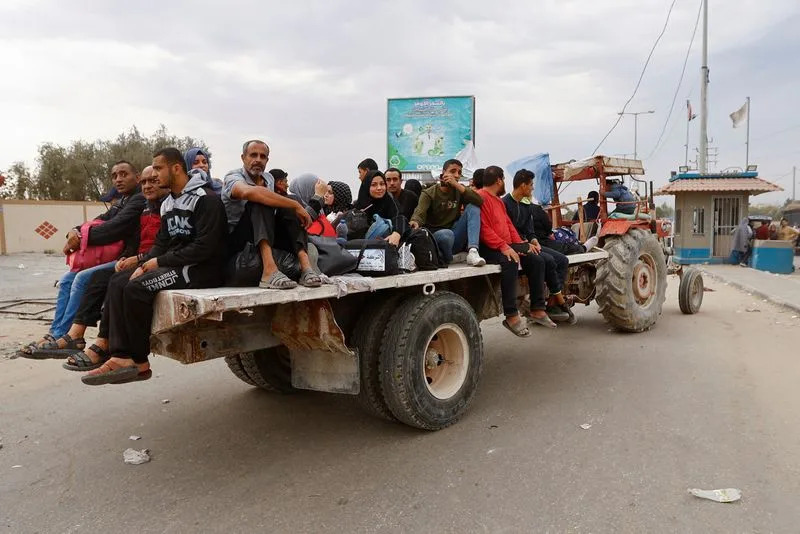
Palestinians fleeing north Gaza move southward, in the central Gaza Strip
JERUSALEM (Reuters) - A senior far-right member of Israeli Prime Minister Benjamin Netanyahu's government said on Tuesday Gaza could not survive as an independent entity and it would be better for Palestinians there to leave for other countries.
Finance Minister Bezalel Smotrich, who heads one of the religious nationalist parties in Netanyahu's coalition, said he supported a call by two members of the Israeli parliament who wrote in a Wall Street Journal editorial that Western countries should accept Gazan families who expressed a desire to relocate.
The comments underscore fears in much of the Arab world that Israel wants to drive Palestinians out of land where they want to build a future state, repeating the mass dispossession of Palestinians when Israel was created in 1948.
"I welcome the initiative of the voluntary emigration of Gaza Arabs to countries around the world," Smotrich said in a statement. "This is the right humanitarian solution for the residents of Gaza and the entire region after 75 years of refugees, poverty and danger."
He said an area as small as the Gaza Strip without natural resources could not survive alone, and added: "The State of Israel will no longer be able to accept the existence of an independent entity in Gaza".
Smotrich spoke during Israel's invasion of the Gaza Strip, a blockaded coastal enclave ruled by the Islamist movement Hamas that is home to some 2.3 million people, most of them refugees after earlier wars.
Palestinians and leaders of Arab countries have accused Israel of seeking a new "Nakba" (catastrophe), the name given to the displacement of hundreds of thousands of Palestinians who fled or were driven from their homes in the wake of the 1948 war that accompanied the founding of the state of Israel.
Most ended up in neighbouring Arab states, and Arab leaders have said any latter-day move to displace Palestinians would be unacceptable.
Israel launched the Gaza operation in retaliation for the Oct. 7 attack by Hamas gunmen who burst out of the enclave and stormed across a string of communities in southern Israel, killing some 1,200 people and taking around 240 as hostages back into Gaza, according to Israeli official figures. Israeli leaders have vowed to destroy Hamas and rescue the hostages.
More than 11,000 Palestinians have been killed during the weeks-long Israeli bombardment of Gaza, according to Palestinian health authorities, and whole stretches of the enclave have been levelled or turned to rubble.
The Israeli military has told residents of northern Gaza to leave their homes and head to the southern end of the Strip, where it said they would be safer, and said they would be able to return once the situation is stabilised.
Israel withdrew its military and settlers from Gaza in 2005 after a 38-year occupation, and Netanyahu has said it does not intend to maintain a permanent presence again, but that Israel would maintain security control for an indefinite period.
However there has been little clarity about Israel's longer term intentions, and countries including the United States have said that Gaza should be governed by Palestinians.
(Reporting by James Mackenzie; editing by Mark Heinrich)
Israeli Lawmakers Call for the West to Take in Gaza Refugees
Dan Ladden-Hall
Tue, November 14, 2023
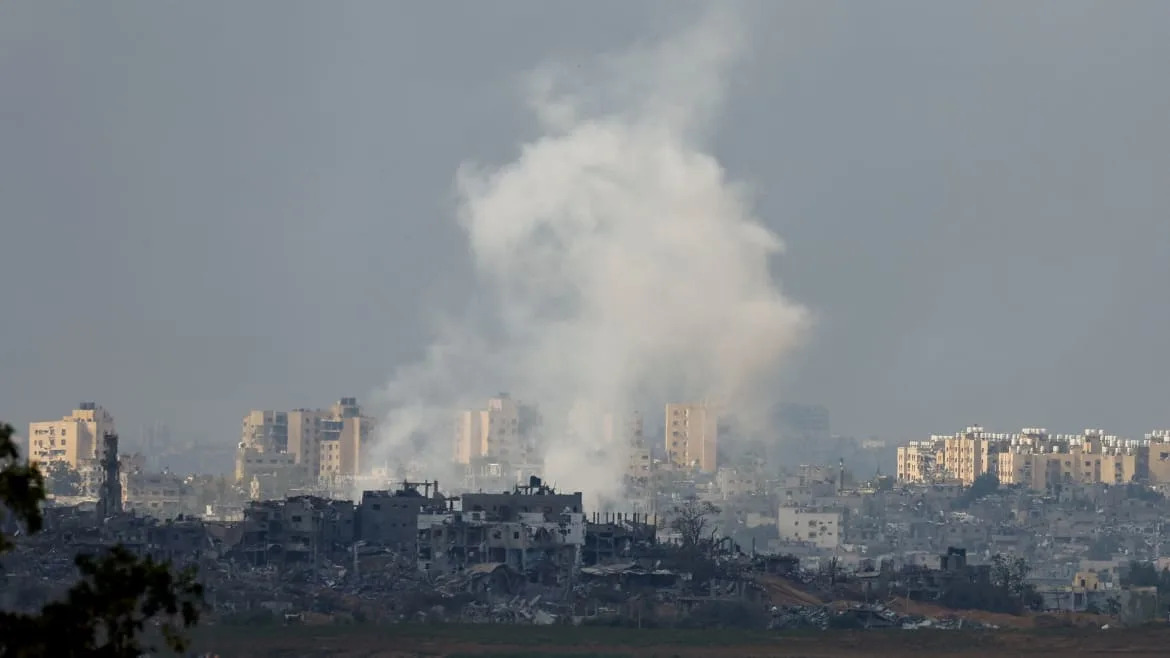
Alexander Ermochenko/Reuters
A pair of Israeli lawmakers wrote an article Monday calling for the West to “welcome” families from Gaza who “have expressed a desire to relocate.” The op-ed published in The Wall Street Journal was written by Danny Danon, a former Israeli representative to the U.N., and Ram Ben-Barak, the ex-deputy director of the Mossad. The lawmakers write that it is crucial for the international community to consider ways to “help civilians caught in the crisis” in Gaza, and that “one idea” is for Western countries to “accept limited numbers of Gazan families who have expressed a desire to relocate.” “Even if countries took in as few as 10,000 people each, it would help alleviate the crisis,” the pair wrote. The op-ed, which some social media users described as a call for ethnic cleansing in Gaza, did not address what would become of the enclave after the current conflict.
Read it at The Wall Street Journal
Is What's Happening in Gaza a Genocide? Experts Weigh In
Solcyre Burga
Tue, November 14, 2023
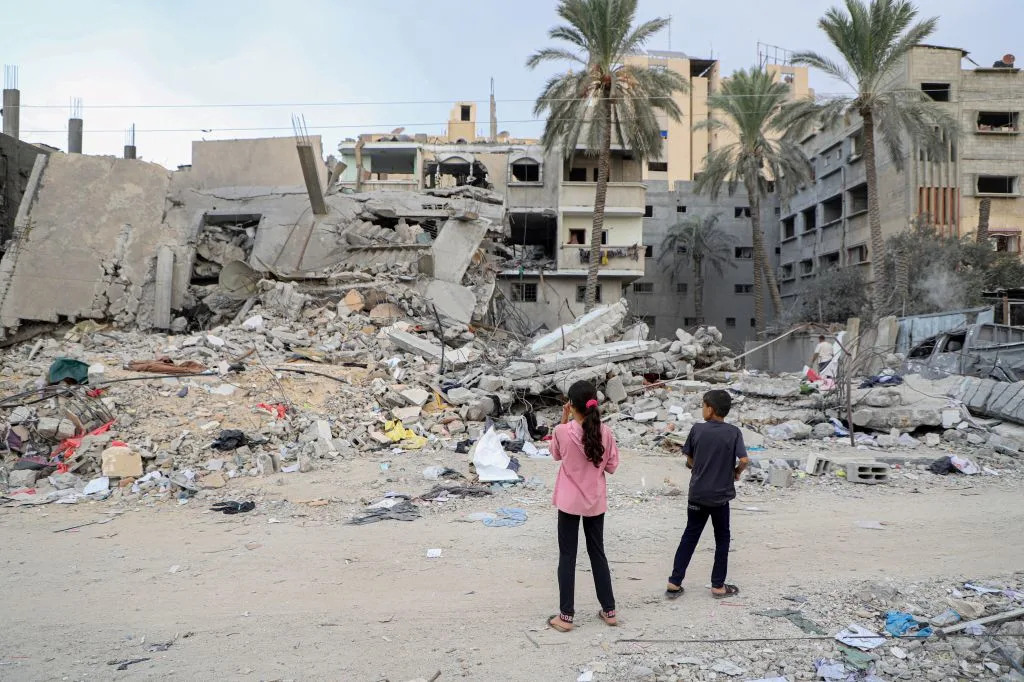
Children stand beside the rubble of buildings destroyed in Israeli airstrikes in the southern Gaza Strip city of Khan Younis on Nov. 12, 2023.
Credit - Rizek Abdeljawad—Xinhua/Getty Images
More than 11,000 people have been killed in Gaza since Oct. 7, after a deadly Hamas attack prompted Israel to declare war and begin a military offensive along the densely-populated strip of land more than 2 million people call home.
Israel has since agreed to enact four-hour daily humanitarian pauses in northern Gaza, after a push by U.S. President Biden, but many international leaders have expressed concern over the civilians caught in the crossfire of war. It’s been enough to prompt Craig Mokhiber, a director at the United Nations, to resign over the organization’s “failure” to act against what he called a "text-book case of genocide." And in a Nov. 2 press release, a separate coalition of U.N. experts similarly expressed concern, warning that Palestinians were “at grave risk of genocide.”
On Thursday, three Palestinian human rights organizations filed a lawsuit with the International Criminal Court (ICC) to request arrest warrants against Israeli leaders—including Prime Minister Benyamin Netanyahu—for genocide.
Scholars are torn on whether the current conflict can be yet classified a genocide officially. TIME spoke to several experts about the meaning of genocide and whether the current conflict could be labeled as such. Here’s what they said.
What is genocide?
Genocide can be defined through three lenses: legal, social scientific, and conventional, according to Alexander Hinton, UNESCO Chair on genocide prevention at Rutgers University in New Jersey.
The U.N. Convention on the Prevention and Punishment of the Crime of Genocide defines genocide as “any of the following acts committed with intent to destroy, in whole or in part, a national, ethnical, racial or religious group, as such.” The acts include “killing members of the group, causing serious bodily or mental harm to members of the group, deliberately inflicting on the group conditions of life calculated to bring about its physical destruction in whole or in part, imposing measures intended to prevent births within the group, and/or forcibly transferring children of the group to another group.”
Most scholars TIME spoke to immediately referenced this definition, which was created in 1948. However, experts say the legal definition is tricky because the threshold to prove genocidal intent is extremely difficult. “One has to prove that the perpetrator not only committed the actions, but they committed the actions with a very specific intention of destroying the group,” says Ernesto Verdeja, a professor at the University of Notre Dame who specializes in genocide. “That can be a high bar because very often people contribute to genocidal policies, even if that's not their direct intention.”
More From TIME
Scholars add, however, that many social scientists define genocide in a broader way. “[The current legal definition] identifies a very narrow set of categories of victims: ethnic, racial, national, religious, but it doesn't take into account people being targeted because of their socioeconomic status, or their political identity, or whatnot,” Verdeja says.
Alexander Hinton, UNESCO Chair on genocide prevention at Rutgers University in New Jersey, says genocide can be defined through three lenses: legal, social scientific, and conventional.
Hinton adds that the more colloquial definition for genocide focuses on the idea of “large scale destruction and acts perpetrated against a population.” Many may point to the Holocaust as the best example of this, though genocide, based on this broader definition, has happened many times over since, in places like Rwanda and Guatemala.
Is what’s happening now a genocide?
Raz Segal, the program director of genocide studies at Stockton University, concretely says it is a “textbook case of genocide.” Segal believes that Israeli forces are completing three genocidal acts, including, “killing, causing serious bodily harm, and measures calculated to bring about the destruction of the group.” He points to the mass levels of destruction and total siege of basic necessities—like water, food, fuel, and medical supplies—as evidence.
He says Israeli leaders expressed “explicit, clear, and direct statements of intent,” pointing to Israeli President Isaac Herzog’s statement during an Oct. 13 press conference. In his statement, Herzog said, “It’s an entire nation that is out there that’s responsible. It’s not true, this rhetoric about civilians not aware, not involved. It’s absolutely not true,” Herzog said. “They could have risen up, they could have fought against that evil regime which took over Gaza in a coup d'etat.” (Herzog later said that he is not holding the civilians of Gaza responsible for keeping Hamas in political power, when asked to clarify by a journalist at the same press conference.) Segal says that this language conflates all Palestinians as “an enemy population,” which could help prove intent.
Many experts TIME spoke to noted that they were answering based on whether they believed that the actions against Palestinians would be considered genocide under a court of law.
Verdeja says Israel's actions in Gaza are moving toward a “genocidal campaign.” While he notes that it is clear Israeli forces intend to destroy Hamas, “the response when you have a security crisis…can be one of ceasefire, negotiation, or it can be genocide.”
City University of New York professor Victoria Sanford compares what’s happening in Gaza to the killing or disappearance of more than 200,000 Mayans in Guatemala from 1960-1996, known as the Guatemalan genocide, which is the subject of her book Buried Secrets: Truth and Human Rights in Guatemala. Mayans and Palestinians have both been subject to genocidal acts, she implies. “When we match them to the lived experience of people, there are similar circumstances…if we look at contemporary conflicts like the Israeli invasion of Palestine.” Sanford and Segal were two of more than a 100 scholars and organizations that signed a letter urging the ICC to take action given the “Israeli intention to commit genocide visibly materialising on the ground."
Sanford is also one of three scholars who signed a declaration in support of a lawsuit announced on Nov. 13 filed by the nonprofit Center for Constitutional Rights. A group of Palestinians living in Gaza and the U.S. as well as human rights organizations, are suing President Joe Biden and other state officials because they allege the U.S. is not taking “all measures available to it to prevent a genocide.”
David Simon, director of the genocide studies program at Yale University, says that Israel has only explicitly said they want to exterminate Hamas, and has not directly stated intent to “destroy a religious, ethnic or racial group.” Simon says it's possible a court could conclude that either Hamas or some elements of the Israel Defense Force (IDF) could be found guilty of committing an act of genocide, but “it's certainly not textbook in that connecting the intent to destroy ethnic group as such is difficult.”
Ben Kiernan, the director of the Cambodian Genocide Program at Yale University, also agrees. In an emailed statement to TIME, he wrote that “Israel's retaliatory bombing of Gaza, however indiscriminate, and its current ground attacks, despite the numerous civilian casualties they are causing among Gaza's Palestinian population, do not meet the very high threshold that is required to meet the legal definition of genocide.”
Hinton also noted that when Mokhiber called it a “textbook case of genocide,” he seemed to be “drawing on a more social scientific understanding that looks at settler colonialism and sort of this long term gradual erasure of a group.”
All scholars who spoke to TIME say that it is much more likely that both Hamas and some Israeli officials could be found guilty of crimes against humanity. Kiernan notes that the groups were more likely to be found guilty of extermination, which “does not require proof of a perpetrator's conscious desire to destroy a group ‘as such.’”
Significance of the use of the word genocide
Some scholars, like Verdeja, say that debates on whether the current conflict can be called a genocide are a “bad use of focus.” Part of that is because proving whether something is a genocide takes time, and does not actually stop people from being killed. Hinton agrees, noting that because genocide is seen as the crime of all crimes, people focus too rigidly on defining a particular moment as such.
Other scholars note that referring to a specific moment as a genocide is extremely significant. Segal points to how the U.S. government refused to call crimes committed against the Hutus in Rwanda a genocide because doing so meant they would have to send personnel to intervene. The lack of action by the U.S. allowed the massacre to continue to unfold, he says.
“Without sticking to the truth, we'll never have a truthful reckoning of how we arrived at the seventh of October, and how we go forward,” Segal says. “We need to name it for what it is.”
Contact us at letters@time.com.
More than 11,000 people have been killed in Gaza since Oct. 7, after a deadly Hamas attack prompted Israel to declare war and begin a military offensive along the densely-populated strip of land more than 2 million people call home.
Israel has since agreed to enact four-hour daily humanitarian pauses in northern Gaza, after a push by U.S. President Biden, but many international leaders have expressed concern over the civilians caught in the crossfire of war. It’s been enough to prompt Craig Mokhiber, a director at the United Nations, to resign over the organization’s “failure” to act against what he called a "text-book case of genocide." And in a Nov. 2 press release, a separate coalition of U.N. experts similarly expressed concern, warning that Palestinians were “at grave risk of genocide.”
On Thursday, three Palestinian human rights organizations filed a lawsuit with the International Criminal Court (ICC) to request arrest warrants against Israeli leaders—including Prime Minister Benyamin Netanyahu—for genocide.
Scholars are torn on whether the current conflict can be yet classified a genocide officially. TIME spoke to several experts about the meaning of genocide and whether the current conflict could be labeled as such. Here’s what they said.
What is genocide?
Genocide can be defined through three lenses: legal, social scientific, and conventional, according to Alexander Hinton, UNESCO Chair on genocide prevention at Rutgers University in New Jersey.
The U.N. Convention on the Prevention and Punishment of the Crime of Genocide defines genocide as “any of the following acts committed with intent to destroy, in whole or in part, a national, ethnical, racial or religious group, as such.” The acts include “killing members of the group, causing serious bodily or mental harm to members of the group, deliberately inflicting on the group conditions of life calculated to bring about its physical destruction in whole or in part, imposing measures intended to prevent births within the group, and/or forcibly transferring children of the group to another group.”
Most scholars TIME spoke to immediately referenced this definition, which was created in 1948. However, experts say the legal definition is tricky because the threshold to prove genocidal intent is extremely difficult. “One has to prove that the perpetrator not only committed the actions, but they committed the actions with a very specific intention of destroying the group,” says Ernesto Verdeja, a professor at the University of Notre Dame who specializes in genocide. “That can be a high bar because very often people contribute to genocidal policies, even if that's not their direct intention.”
More From TIME
Scholars add, however, that many social scientists define genocide in a broader way. “[The current legal definition] identifies a very narrow set of categories of victims: ethnic, racial, national, religious, but it doesn't take into account people being targeted because of their socioeconomic status, or their political identity, or whatnot,” Verdeja says.
Alexander Hinton, UNESCO Chair on genocide prevention at Rutgers University in New Jersey, says genocide can be defined through three lenses: legal, social scientific, and conventional.
Hinton adds that the more colloquial definition for genocide focuses on the idea of “large scale destruction and acts perpetrated against a population.” Many may point to the Holocaust as the best example of this, though genocide, based on this broader definition, has happened many times over since, in places like Rwanda and Guatemala.
Is what’s happening now a genocide?
Raz Segal, the program director of genocide studies at Stockton University, concretely says it is a “textbook case of genocide.” Segal believes that Israeli forces are completing three genocidal acts, including, “killing, causing serious bodily harm, and measures calculated to bring about the destruction of the group.” He points to the mass levels of destruction and total siege of basic necessities—like water, food, fuel, and medical supplies—as evidence.
He says Israeli leaders expressed “explicit, clear, and direct statements of intent,” pointing to Israeli President Isaac Herzog’s statement during an Oct. 13 press conference. In his statement, Herzog said, “It’s an entire nation that is out there that’s responsible. It’s not true, this rhetoric about civilians not aware, not involved. It’s absolutely not true,” Herzog said. “They could have risen up, they could have fought against that evil regime which took over Gaza in a coup d'etat.” (Herzog later said that he is not holding the civilians of Gaza responsible for keeping Hamas in political power, when asked to clarify by a journalist at the same press conference.) Segal says that this language conflates all Palestinians as “an enemy population,” which could help prove intent.
Many experts TIME spoke to noted that they were answering based on whether they believed that the actions against Palestinians would be considered genocide under a court of law.
Verdeja says Israel's actions in Gaza are moving toward a “genocidal campaign.” While he notes that it is clear Israeli forces intend to destroy Hamas, “the response when you have a security crisis…can be one of ceasefire, negotiation, or it can be genocide.”
City University of New York professor Victoria Sanford compares what’s happening in Gaza to the killing or disappearance of more than 200,000 Mayans in Guatemala from 1960-1996, known as the Guatemalan genocide, which is the subject of her book Buried Secrets: Truth and Human Rights in Guatemala. Mayans and Palestinians have both been subject to genocidal acts, she implies. “When we match them to the lived experience of people, there are similar circumstances…if we look at contemporary conflicts like the Israeli invasion of Palestine.” Sanford and Segal were two of more than a 100 scholars and organizations that signed a letter urging the ICC to take action given the “Israeli intention to commit genocide visibly materialising on the ground."
Sanford is also one of three scholars who signed a declaration in support of a lawsuit announced on Nov. 13 filed by the nonprofit Center for Constitutional Rights. A group of Palestinians living in Gaza and the U.S. as well as human rights organizations, are suing President Joe Biden and other state officials because they allege the U.S. is not taking “all measures available to it to prevent a genocide.”
David Simon, director of the genocide studies program at Yale University, says that Israel has only explicitly said they want to exterminate Hamas, and has not directly stated intent to “destroy a religious, ethnic or racial group.” Simon says it's possible a court could conclude that either Hamas or some elements of the Israel Defense Force (IDF) could be found guilty of committing an act of genocide, but “it's certainly not textbook in that connecting the intent to destroy ethnic group as such is difficult.”
Ben Kiernan, the director of the Cambodian Genocide Program at Yale University, also agrees. In an emailed statement to TIME, he wrote that “Israel's retaliatory bombing of Gaza, however indiscriminate, and its current ground attacks, despite the numerous civilian casualties they are causing among Gaza's Palestinian population, do not meet the very high threshold that is required to meet the legal definition of genocide.”
Hinton also noted that when Mokhiber called it a “textbook case of genocide,” he seemed to be “drawing on a more social scientific understanding that looks at settler colonialism and sort of this long term gradual erasure of a group.”
All scholars who spoke to TIME say that it is much more likely that both Hamas and some Israeli officials could be found guilty of crimes against humanity. Kiernan notes that the groups were more likely to be found guilty of extermination, which “does not require proof of a perpetrator's conscious desire to destroy a group ‘as such.’”
Significance of the use of the word genocide
Some scholars, like Verdeja, say that debates on whether the current conflict can be called a genocide are a “bad use of focus.” Part of that is because proving whether something is a genocide takes time, and does not actually stop people from being killed. Hinton agrees, noting that because genocide is seen as the crime of all crimes, people focus too rigidly on defining a particular moment as such.
Other scholars note that referring to a specific moment as a genocide is extremely significant. Segal points to how the U.S. government refused to call crimes committed against the Hutus in Rwanda a genocide because doing so meant they would have to send personnel to intervene. The lack of action by the U.S. allowed the massacre to continue to unfold, he says.
“Without sticking to the truth, we'll never have a truthful reckoning of how we arrived at the seventh of October, and how we go forward,” Segal says. “We need to name it for what it is.”
Contact us at letters@time.com.
